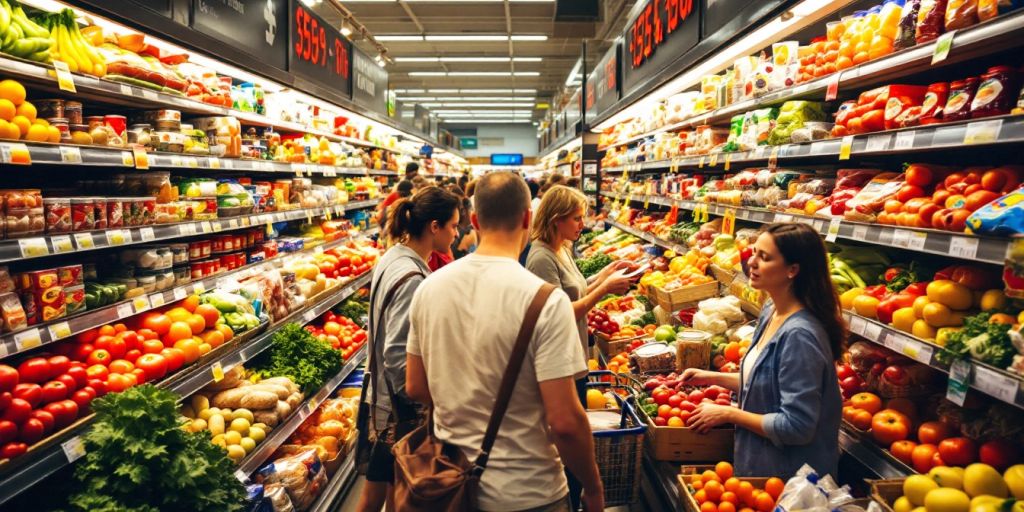Child Welfare
Trump’s Immigration Policy Would Make Food Inflation Even Worse

In a time when food prices remain a pressing concern for many Americans, former President Donald Trump’s immigration policy is under scrutiny for its potential impact on food inflation. Recent discussions highlight how proposed changes could exacerbate the already high costs of food, which have been a significant issue for voters across the political spectrum.
Key Takeaways
- Food inflation remains a critical issue, with many Americans feeling the pinch.
- Trump’s immigration policy could lead to labor shortages in the agricultural sector.
- A recent poll shows bipartisan support for measures to combat price gouging.
The Current State Of Food Prices
Food prices have been a hot topic in the United States, with many consumers expressing frustration over rising costs. Although food inflation has shown signs of cooling, it remains a significant concern for voters. A recent poll indicated that 80% of likely voters in swing states support Democratic nominee Kamala Harris’ plan to ban price gouging, reflecting a widespread desire for solutions to high food prices.
Trump’s Immigration Policy And Its Implications
Trump’s proposed immigration policy has raised alarms among agricultural experts and economists. The policy aims to restrict immigration, which could lead to labor shortages in the farming sector. This shortage could have several consequences:
- Reduced Crop Yields: With fewer workers available to harvest crops, farmers may struggle to bring in their produce, leading to lower supply.
- Increased Prices: A decrease in supply typically results in higher prices for consumers, further exacerbating food inflation.
- Economic Impact: The agricultural sector is a significant part of the U.S. economy, and disruptions could have ripple effects on related industries.
The Role Of Tariffs In Food Pricing
In addition to immigration policy, Trump has discussed using tariffs as a means to control food prices. However, this approach is controversial. Tariffs are generally intended to make imported goods more expensive, which could lead to higher prices for consumers rather than lower ones. This strategy raises questions about its effectiveness in addressing food inflation.
Public Sentiment And Political Responses
The public’s frustration with food prices has led to increased scrutiny of political candidates and their proposed solutions. While Trump focuses on tariffs and immigration, many voters are looking for more immediate and effective measures to combat rising costs. The bipartisan support for Harris’ plan to ban price gouging indicates a strong desire for action that directly addresses consumer concerns.
Conclusion
As the election approaches, the implications of Trump’s immigration policy on food inflation will likely remain a key issue for voters. With food prices continuing to strain household budgets, the need for effective solutions is more pressing than ever. The intersection of immigration, tariffs, and food pricing will be a critical topic in the ongoing political discourse, shaping the decisions of voters across the nation.
Sources
-

 Press Release4 days ago
Press Release4 days agoClinical Trials Market Set for Robust Growth, Driven by Drug Development Surge and Digital Innovation
-

 Press Release6 days ago
Press Release6 days agoBellarium ($BEL) Price Prediction: Could It Hit $5 by 2026?
-

 Press Release4 days ago
Press Release4 days agoIndustrial Boiler Market Expected to Surpass USD 24.4 Billion by 2035 Amid Growing Demand for Energy Efficiency and Industrialization
-

 Business5 days ago
Business5 days agoHow Managed IT Solutions Help Small Teams Compete at Enterprise Scale
-

 Press Release4 days ago
Press Release4 days agoPreventive Vaccines Market to Witness Strong Growth by 2035
-

 Press Release4 days ago
Press Release4 days agoGreen Bio Chemicals Market Poised for Sustainable Growth amidst Global Shift to Eco-Friendly Alternatives by 2035
-

 Press Release4 days ago
Press Release4 days agoFill-Finish Pharmaceutical Contract Manufacturing Market Expected to Flourish Amid Biopharmaceutical Boom and Global Outsourcing Trend by 2035
-

 Press Release4 days ago
Press Release4 days agoPet Food Nutraceutical Market Set for Robust Expansion Amid Rising Demand for Pet Wellness by 2035










